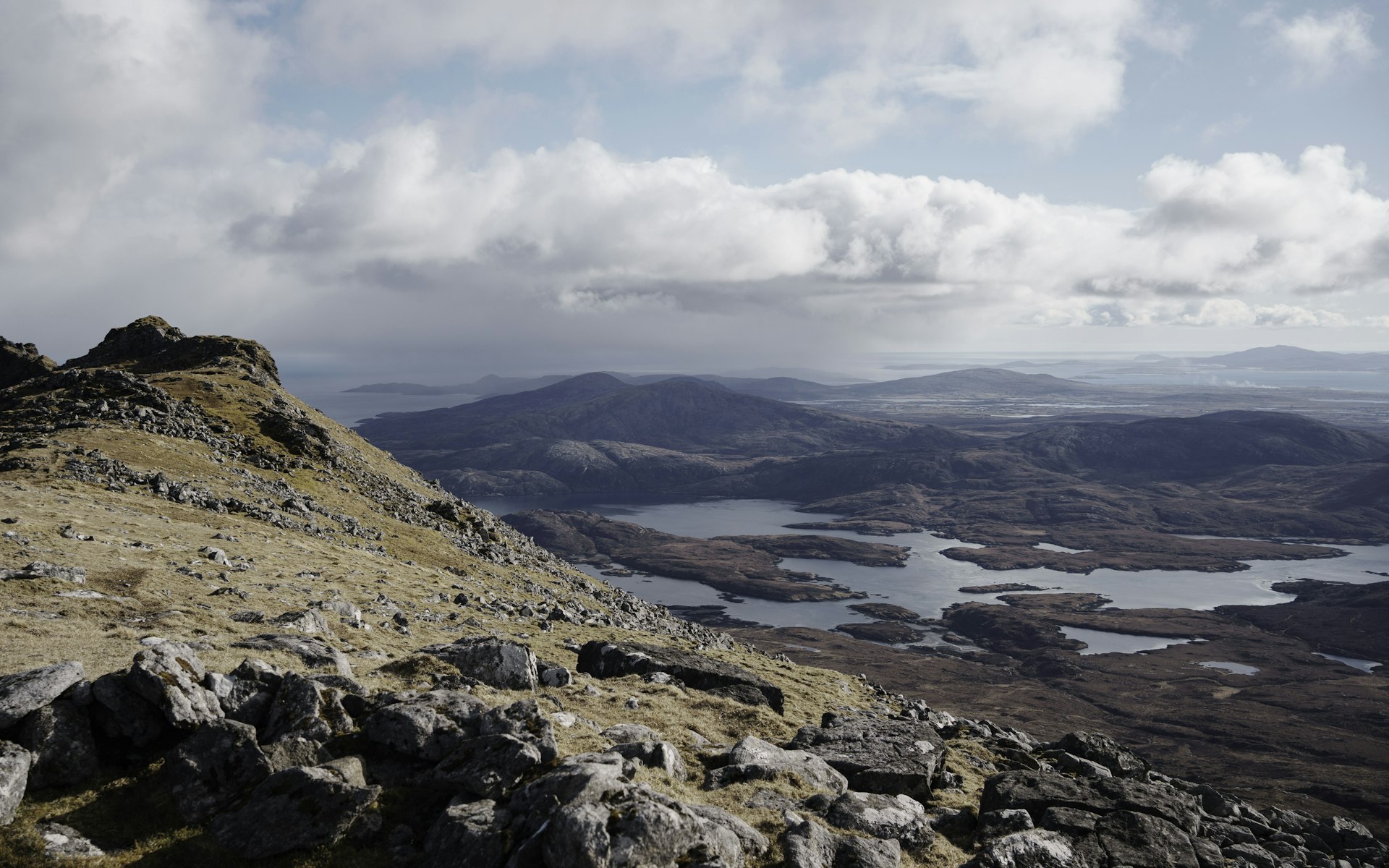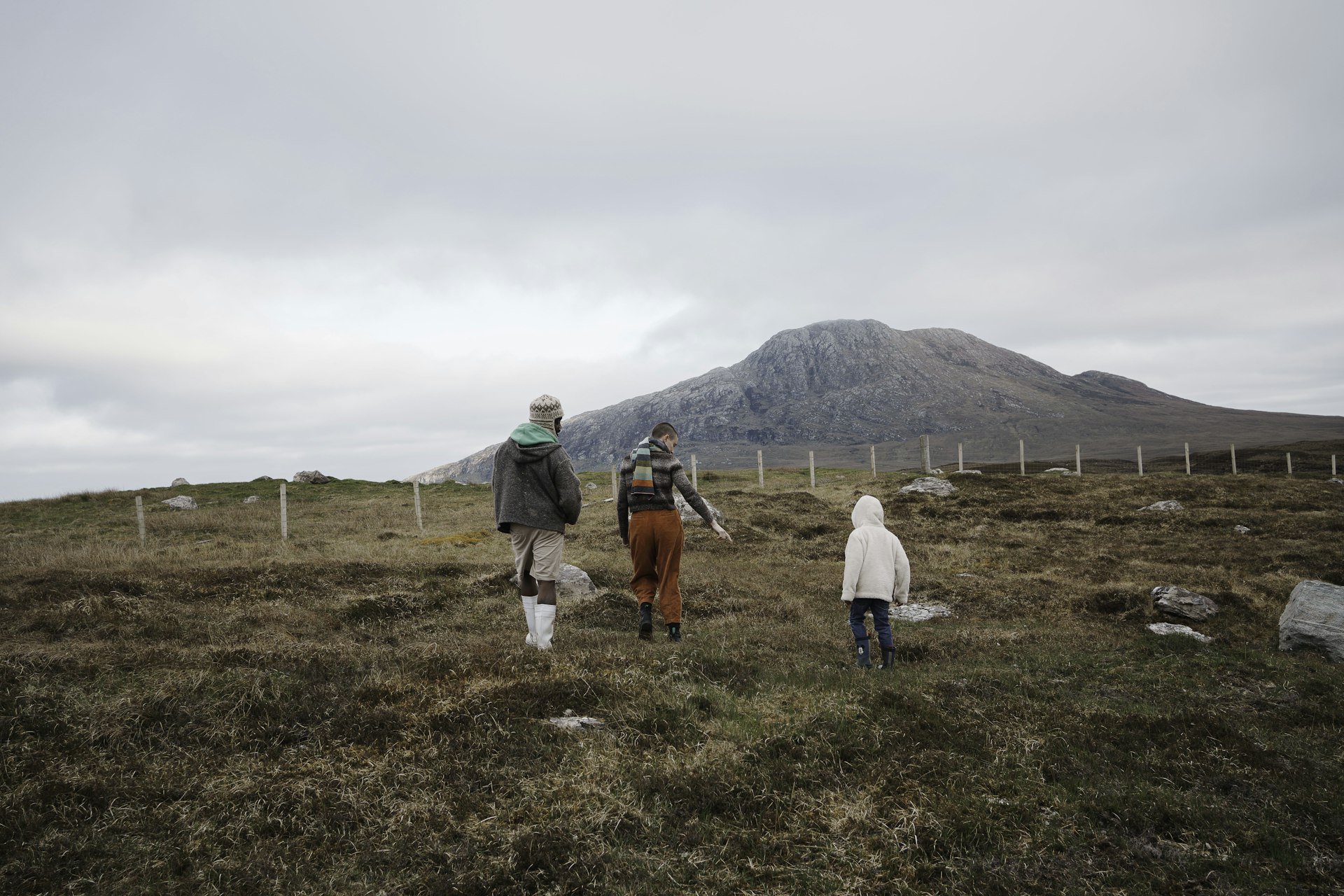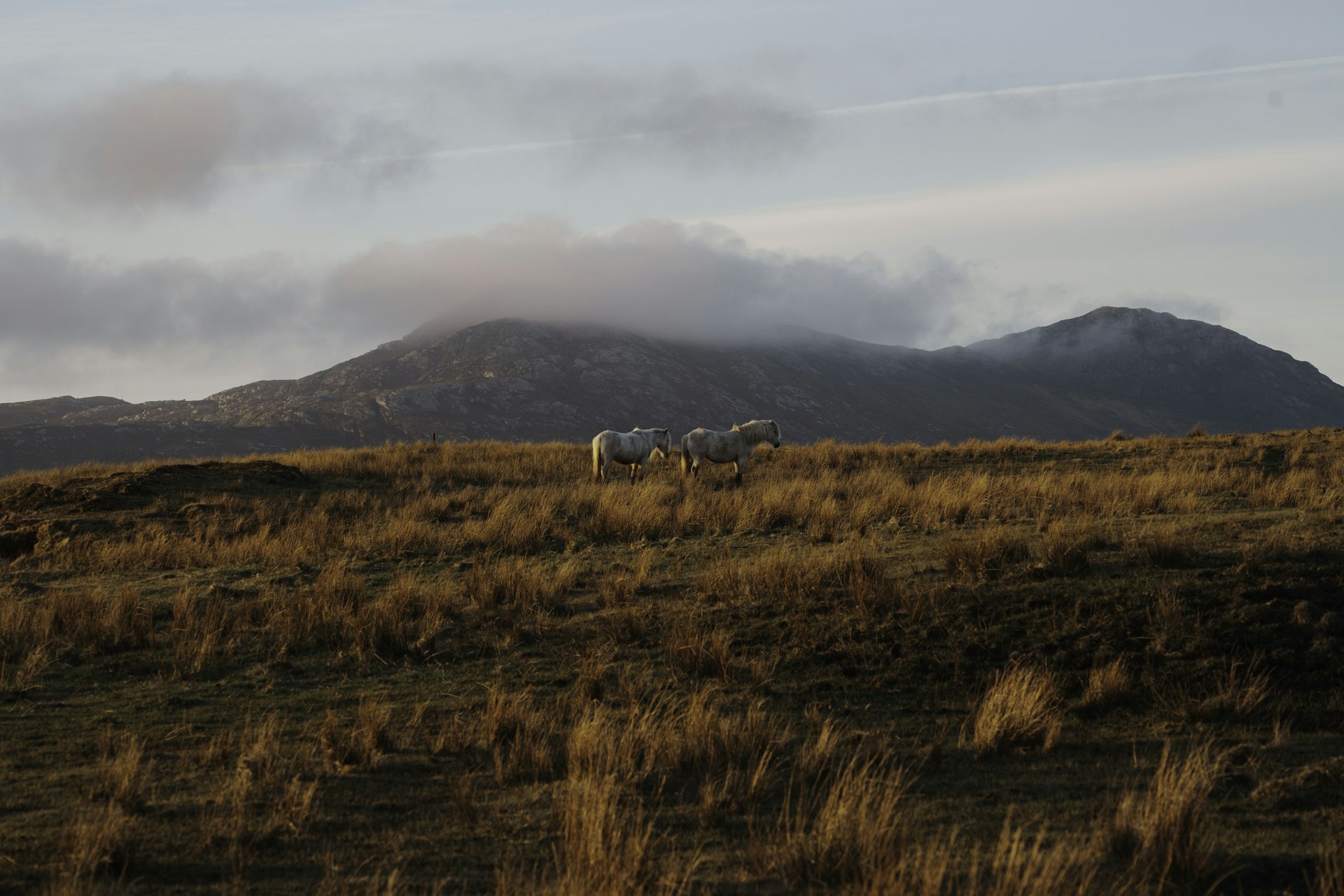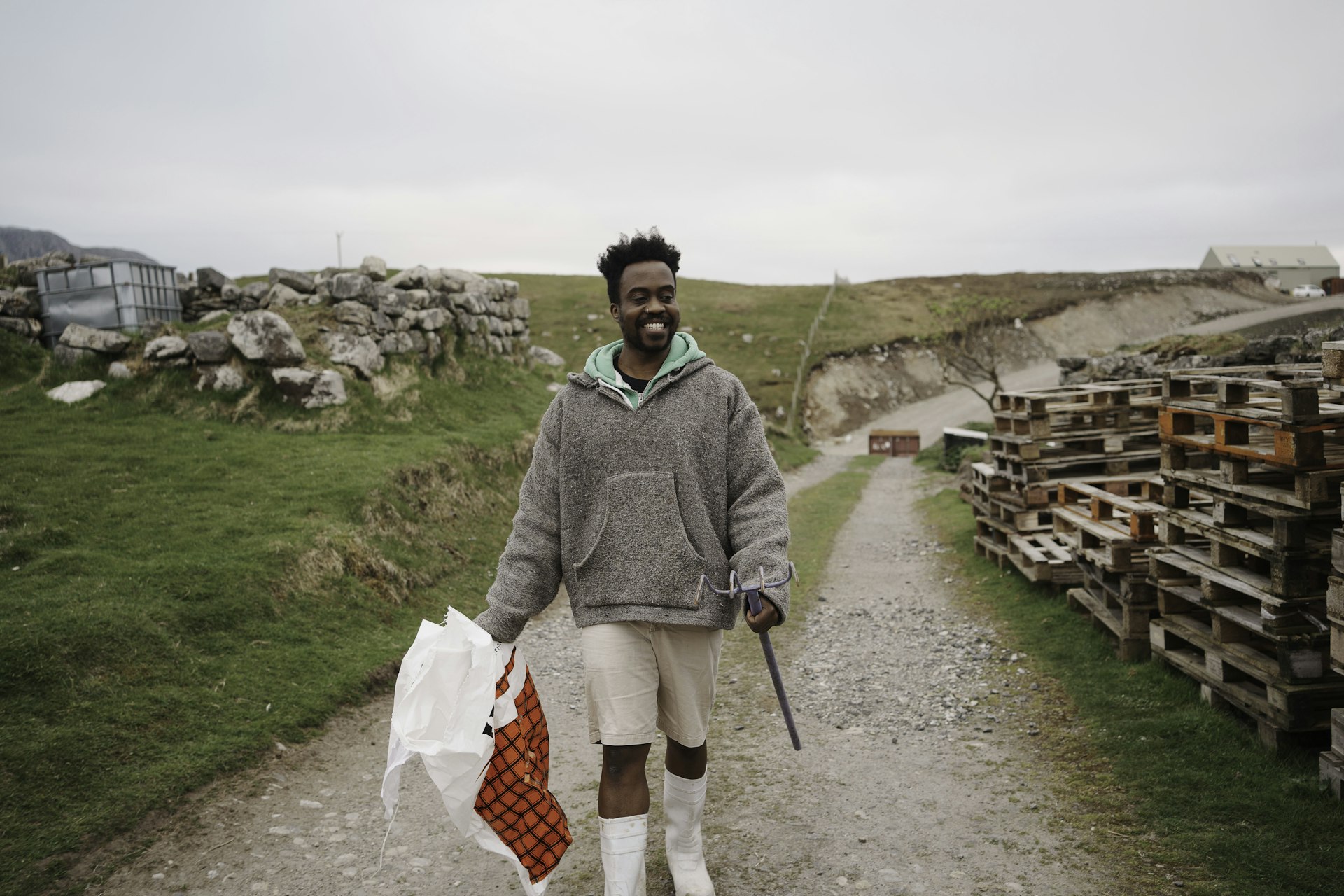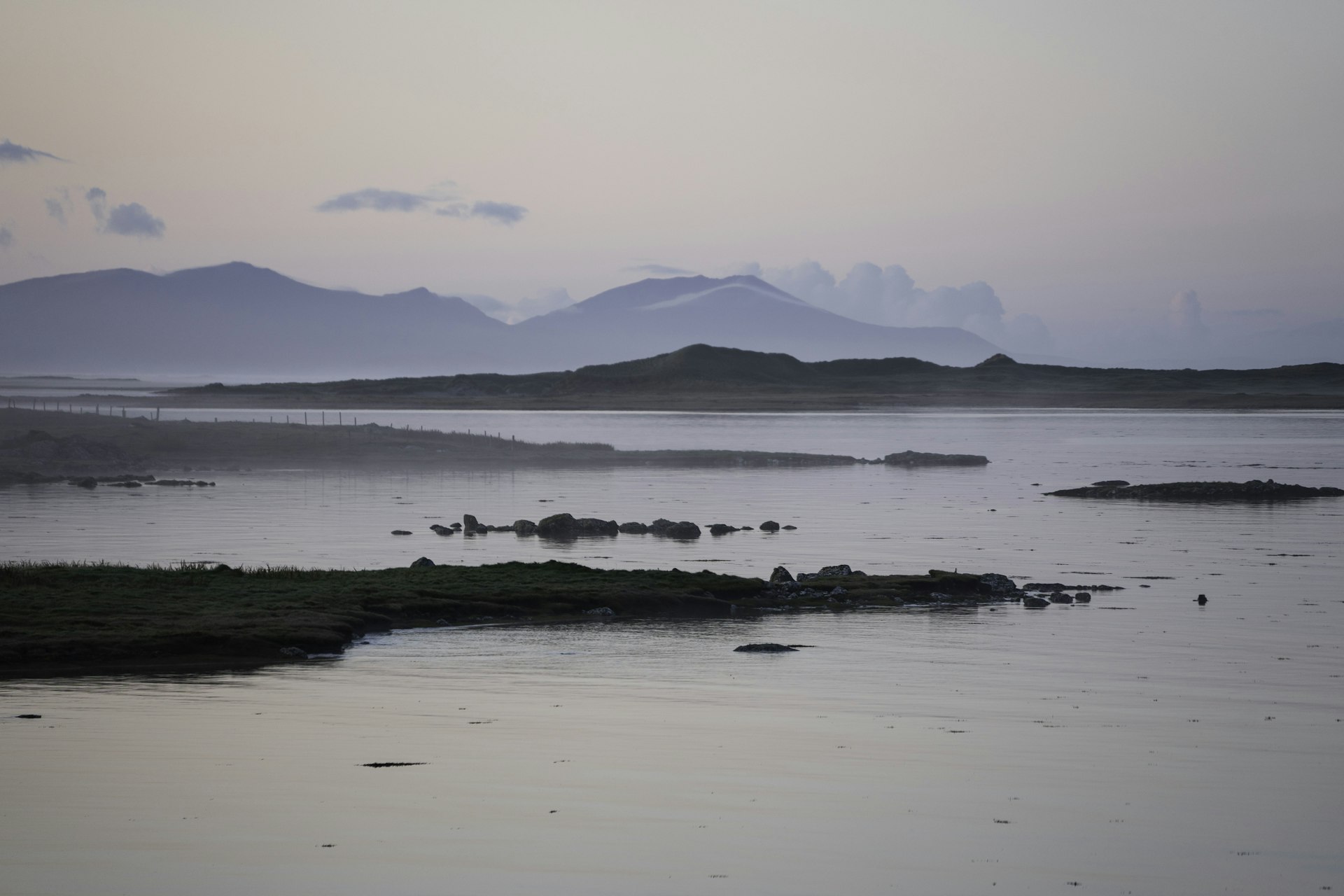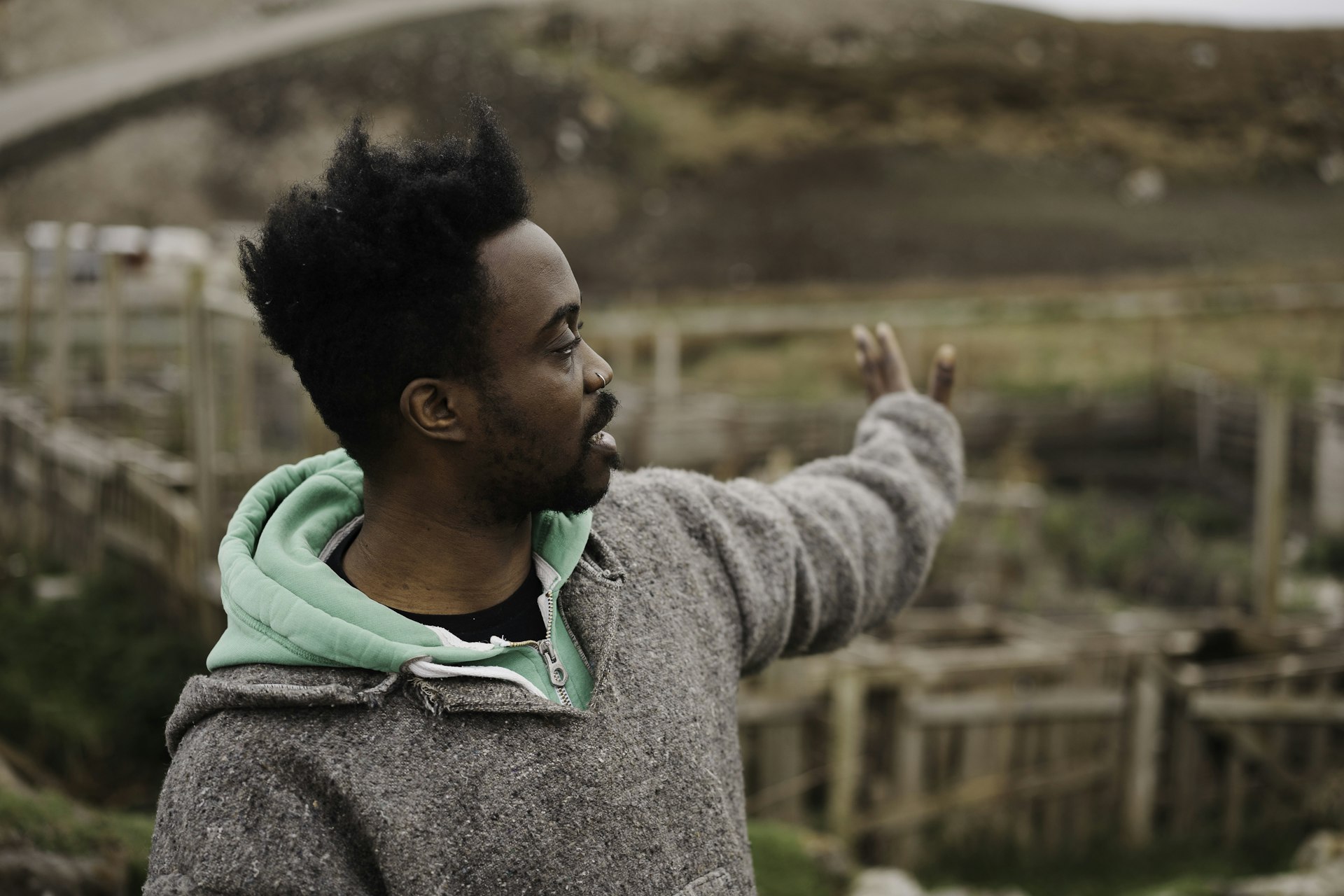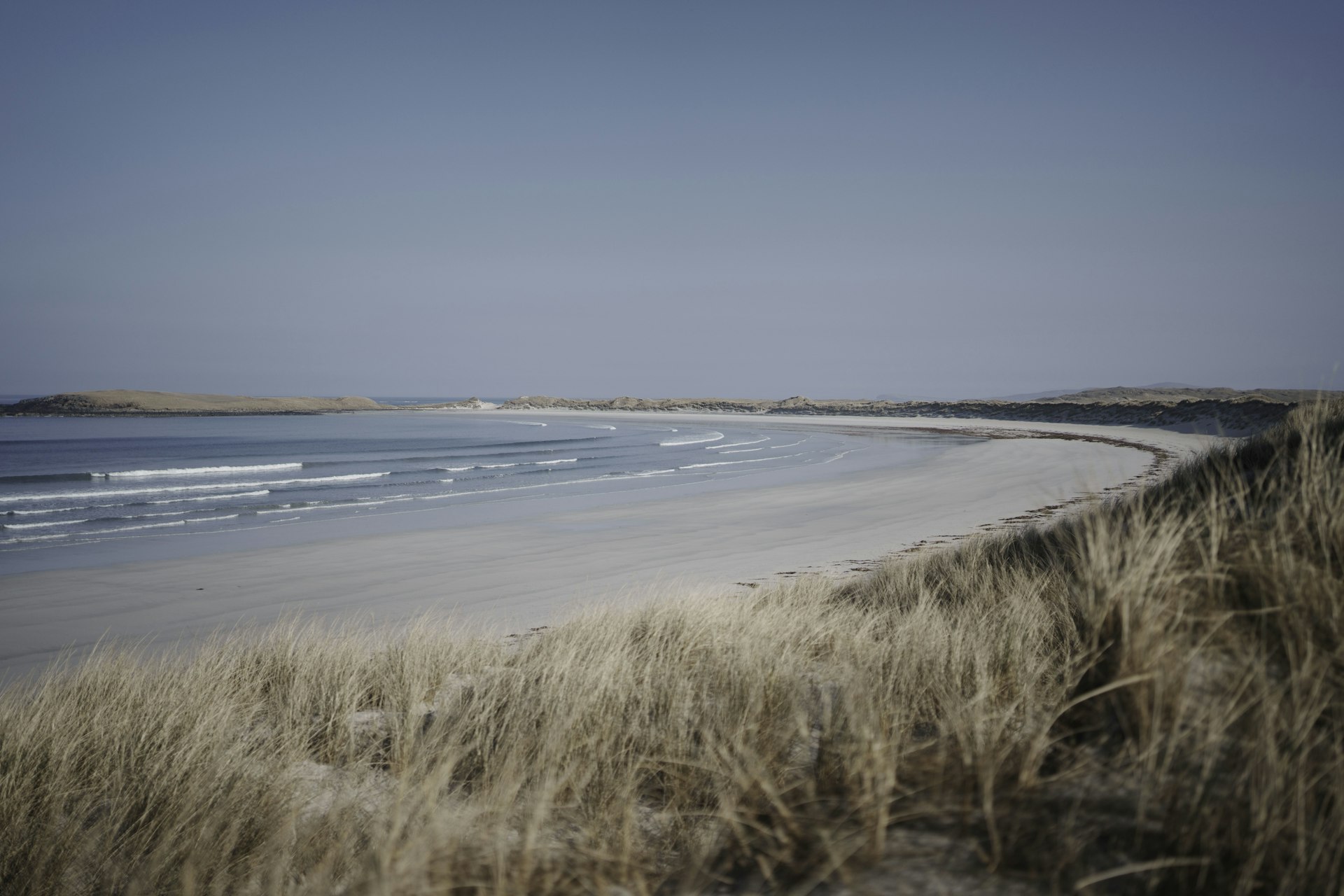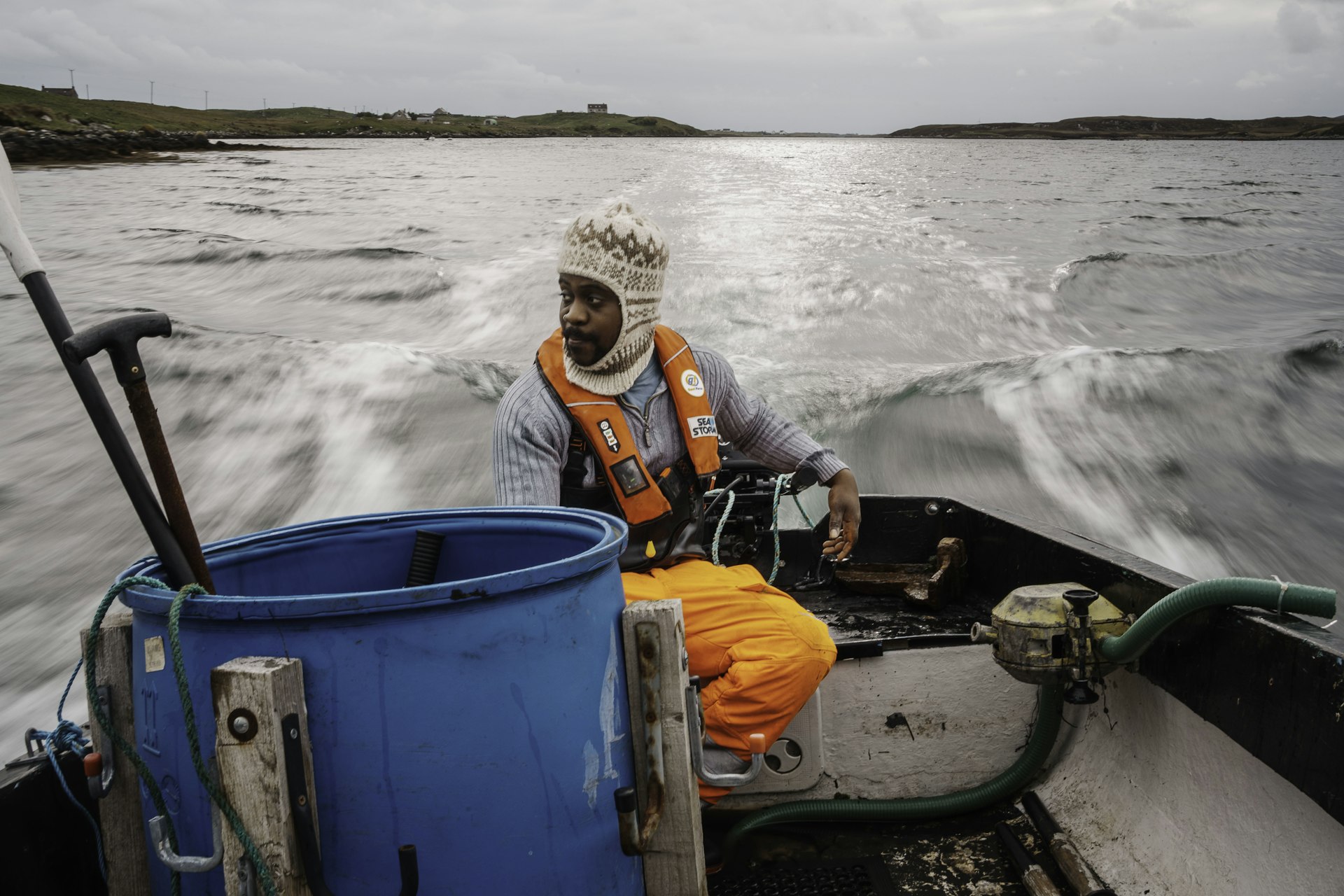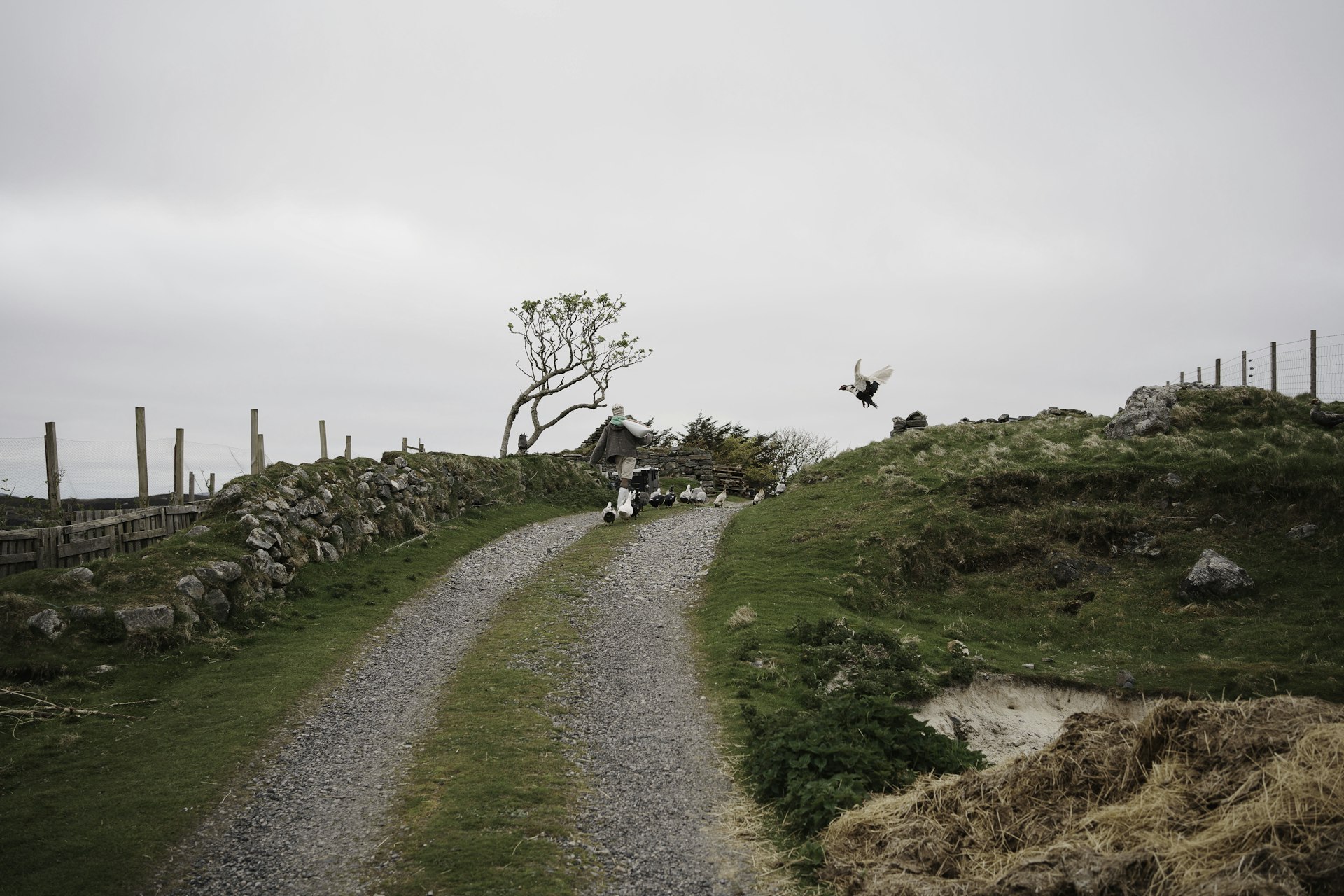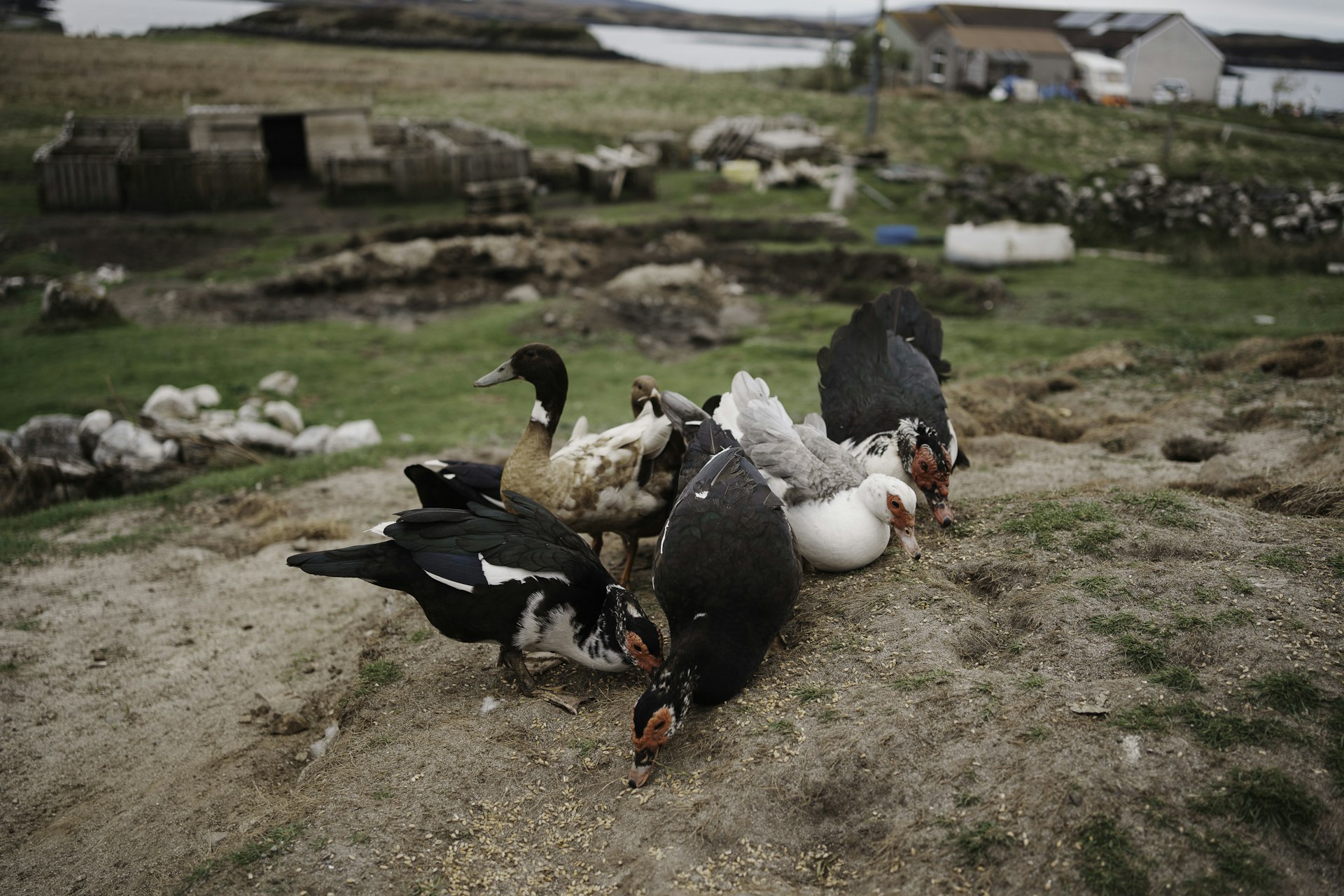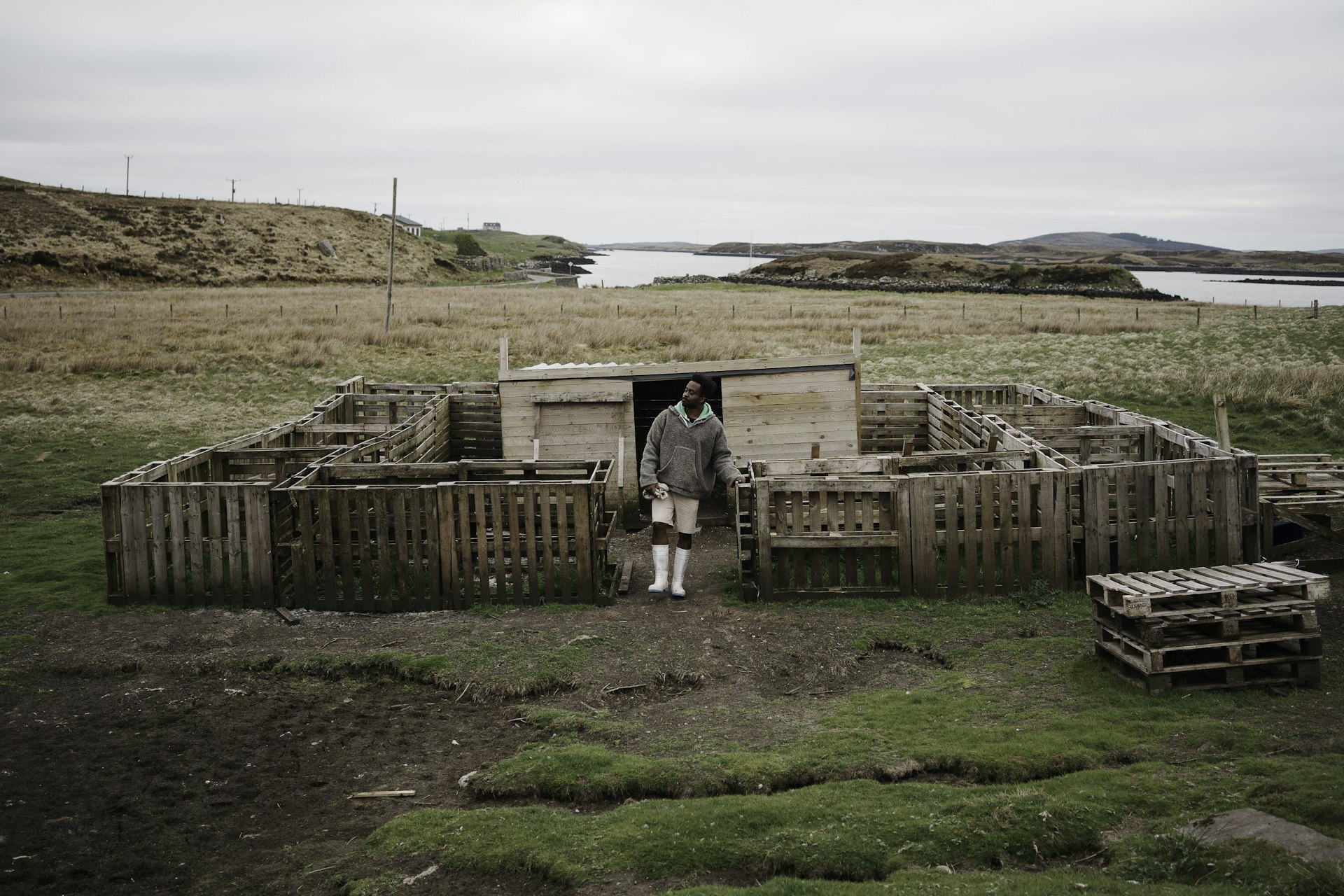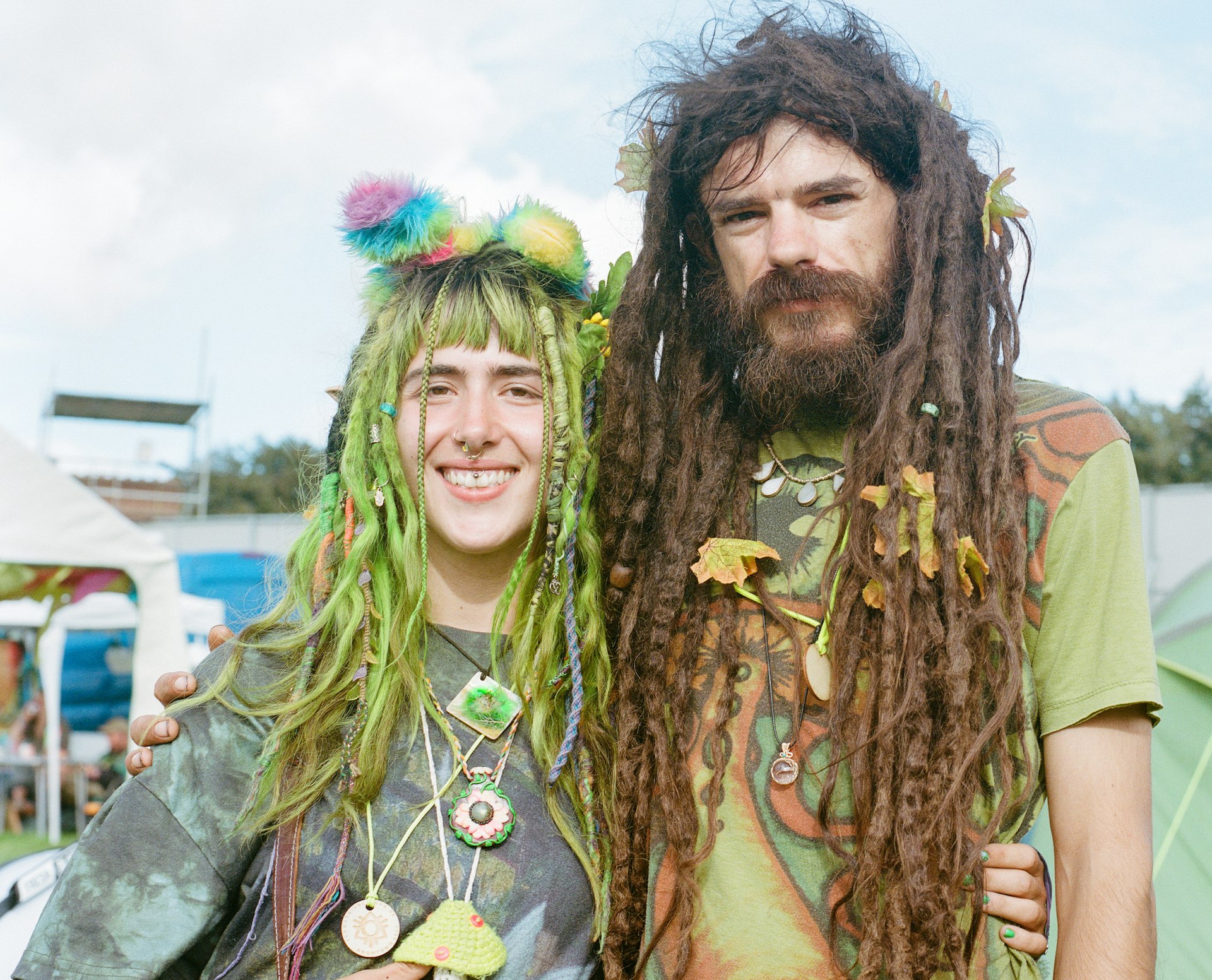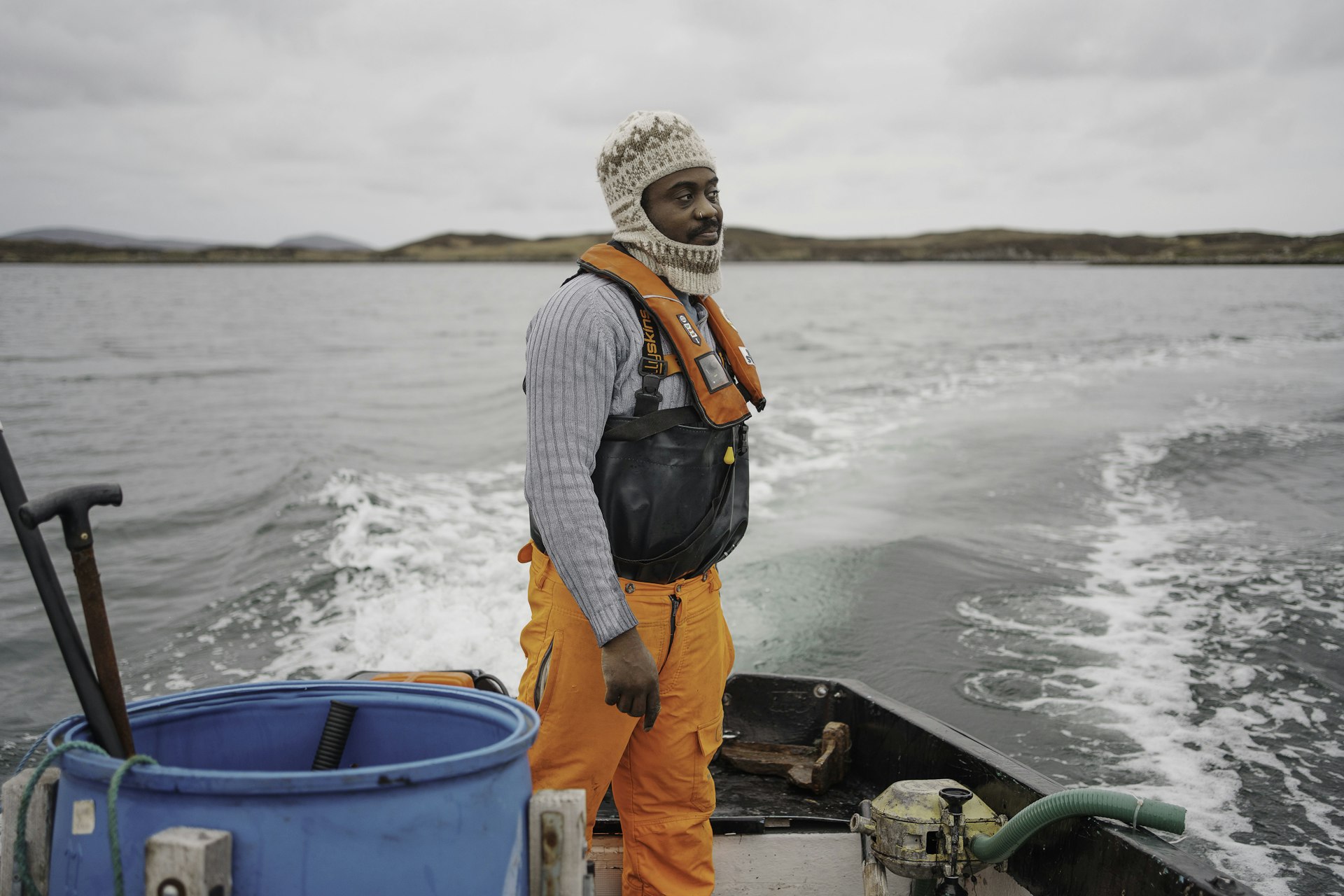
The Black seaweed farmer growing a new life on the Scottish Isles
- Text by Alex King
- Photography by Raphael Rychetsky & Rosalind Blake
A man with orange waders and a hand-knitted, open-face balaclava is standing in sea water up to his knees, brandishing a scythe. He leans forward, slicing under the water’s surface with the long, curved blade. Each slice produces a large handful of seaweed. After a day of this backbreaking work, the man has amassed tonnes of seaweed, which he encloses in a floating net and attaches to the back of his small motorboat. On a good day, he can harvest up to eight tonnes of wild Ascophyllum Nodosum or Knotted Wrack – seaweed to you and I. Pulling the engine into life, he begins to tow this giant ball of seaweed back to port, blasting out soul and Motown tunes to drown out the whine of the outboard.
Alexander Thompson-Byer is a permaculture farmer, seaweed harvester and one of the only People of Colour on Scotland’s Outer Hebrides. Alex grew up in South London and fell in love with gardening at age 19. He turned his love of plants and nature into a successful business but by his mid-thirties, he was growing increasingly disillusioned with city life. In 2020, Alex and his partner Susannah decided to relocate with their young son Cedar to the island of North Uist.
Alex is the first Black seaweed farmer in the Hebrides. He’s renting a small piece of land called a croft in one of the most remote and windswept parts of the British Isles. Here, he’s rearing ducks and chickens and developing a permaculture project, documenting his day-to-day on Instagram and his YouTube channel. He’s hoping to shatter the common image of a farmer as an old white man and inspire others to live off the land, whatever their background.
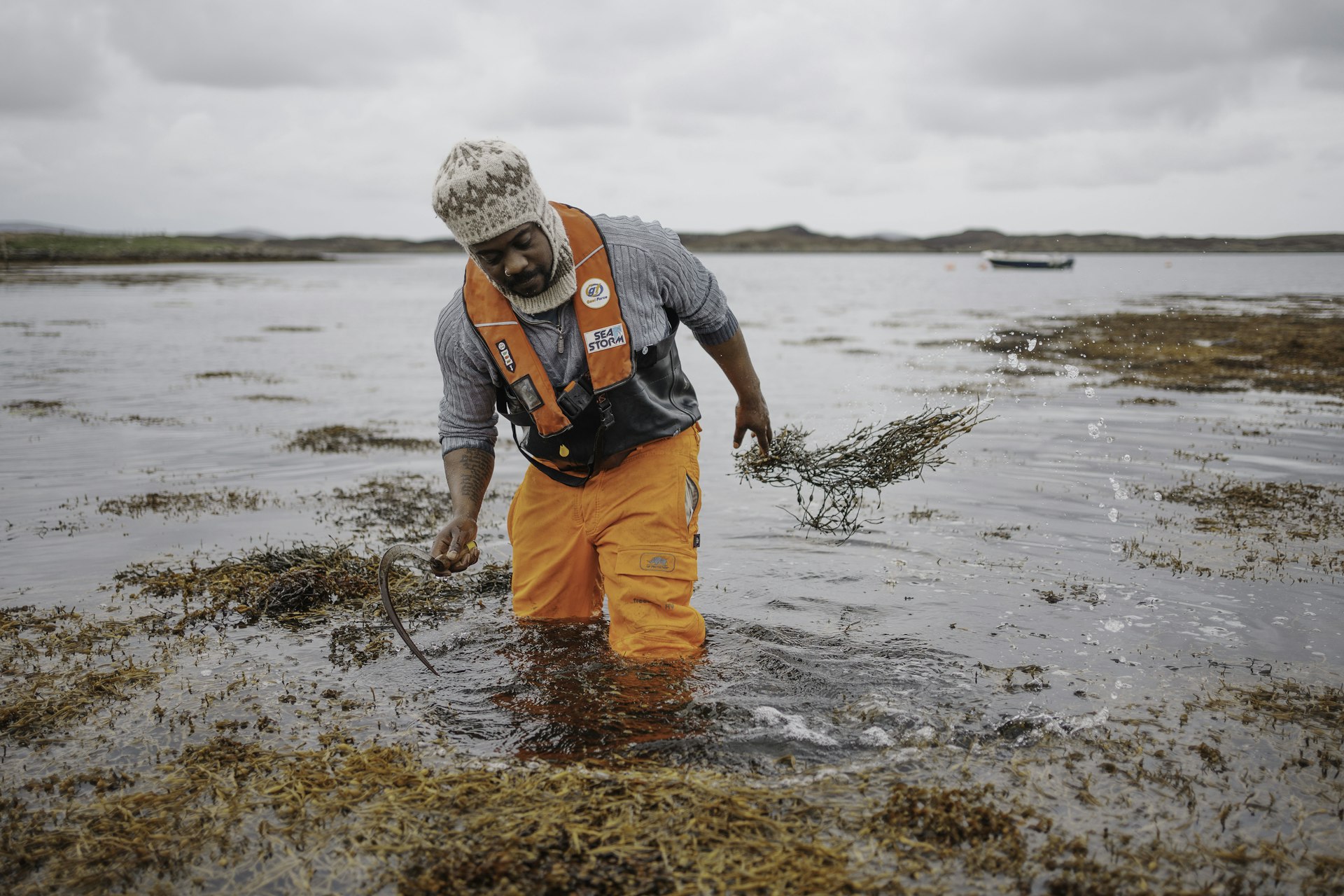
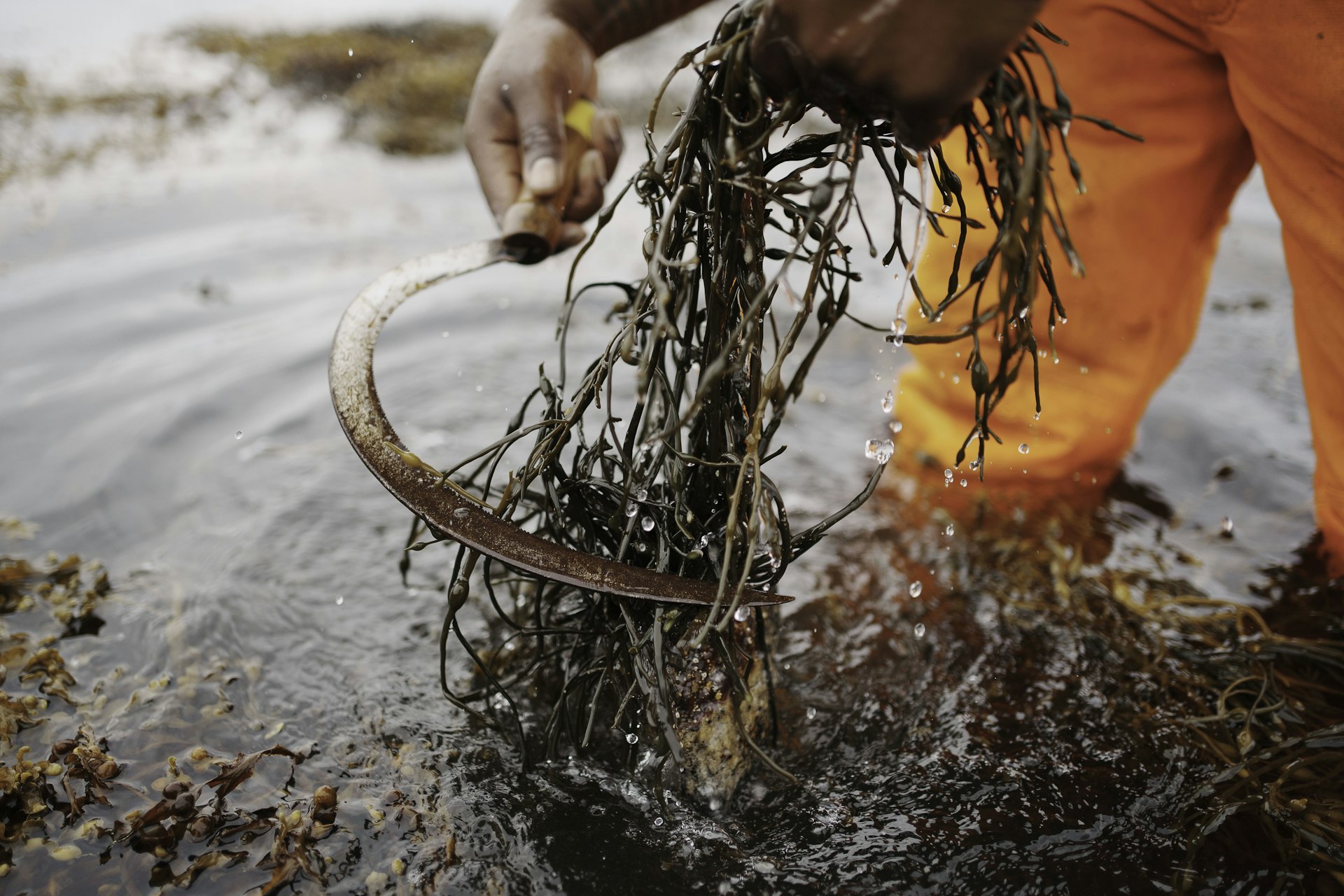
“I’ve never felt more connected to nature,” Alex explains. “I like being outdoors and I like to be independent. You genuinely feel free here and you never stop learning. You have to follow the tides when you harvest seaweed. I’m now so in tune with the cycles of the moon.”
Before leaving Crawley in Sussex, just outside London, Alex ran his gardening business, Mantra Landscapes, and tended to a small, three-acre patch of land. But becoming a father made Alex reflect on the life he really wanted for himself and for his growing family.
“I still love and miss London,” Alex reflects. “It’s an amazing, beautiful place and there are so many things going on. But having to pay the mortgage, money became the main driver of everything. Susannah and I were just working, working, working and we never had time to spend with each other or with our son, Cedar. I would even feel guilty whenever I went to tend my small patch of land.”
Susannah grew up on Uist, with her mum working as a doctor and her dad for the coastguard. She left to study at university with no desire to ever come back. Over a decade later, Uist has changed. But it remains a small, tight-knit community that can be intimidating to outsiders. Alex is Black, his partner Susannah is White and their son Cedar is mixed. They wondered how Uist would react to the arrival of an interracial family from London.
“I had a lot of preconceptions about what it was going to be like moving to a small island,” Alex explains. “Everyone does know everyone. So, it’s funny driving around and seeing people staring at you and double-taking, thinking ‘Who’s this?’ Some people are a bit closed-off and it takes a while to get to know them. You have to prove yourself, that you’re serious about crofting and making a life here.”
Alex stands out wherever he goes, with a nose ring, shaggy beard and an infectious smile. But what really makes Alex an outlier is that he’s a farmer. Farming is the least diverse industry in England and Wales, according to the Labour Force Survey of 2015, with 98.6% of farmers identifying as White British.
“The identity of being a farmer is, in this country, very much tied to being a landowner and inheriting a farm – something that is unlikely for BPOC [Black People and People of Colour],” explains researcher Naomi Terry, author of Jumping Fences: Land, Food and Racial Justice in British Farming. “Many BPOC have recent migrations in their family’s past from countries where agricultural livelihoods are more commonplace, and paradoxically this career path is not so open to them in Britain – there are many reasons for these barriers.”
Alex was one of 16 Farmers of Colour who shared their experiences for Jumping Fences, produced by Ecological Land Cooperative, Land In Our Names and The Landworkers’ Alliance. The 2023 report details many layers of exclusion that prevent People of Colour from working on the land in the UK. There is a major lack of representation of Farmers of Colour, while some respondents experienced overt racism on work exchange farms, at agricultural universities or in the pub.
“There is also a cultural image of who a farmer is: old, white and male,” Terry explains. “Other forms of oppression are intertwined and inseparable from racial oppression.” Often physically demanding, farm work is deemed inaccessible for those with illness or different abilities; while gender discrimination and misogyny assumes male bodies are more suited to practical work. Much of the farming system relies on seasonal migrant labourers, yet there are many examples of rural communities displaying hostility to immigrants and Gypsy, Roma and Traveller people, as well as religious intolerance, such as Islamophobia.
“Being on Uist has made me feel like a free man.”
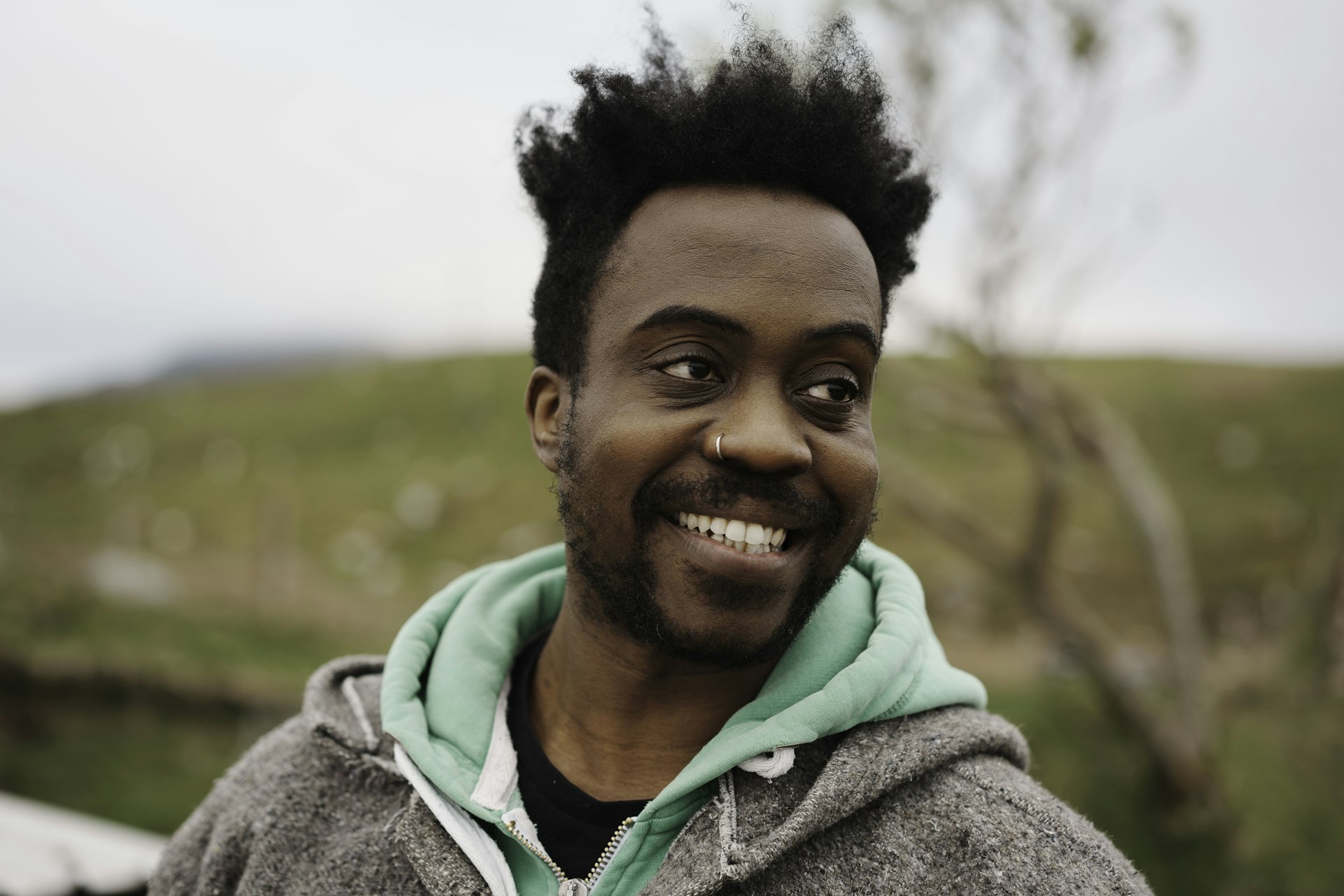
Similar dynamics play out across the Global North. Yet, Britain is an outlier in the extent to which class privilege and extreme concentration of land ownership create such a formidable barrier to working on the land. One percent of the population owns half of all land in England. Research by author Guy Shrubsole and data journalist Anna Powell-Smith found that the largest segment, 30% of all land in England, is owned by the gentry and aristocracy, passed down from one generation to the next.
The unfairness of land distribution in the UK is layered upon a deeper injustice: many of Britain’s wealthy estates have links to colonialism and historic slavery, as research by the National Trust has shown. “The accumulation of land through feudal and colonial legacies, and the ways in which the exploitation of land continues to contribute to inequity and ecological crises brings into sharper resolution the insidious nature of our farming system,” Terry explains.
While much land ownership in Scotland is entangled with slavery and colonial exploitation, too, the Scottish Parliament’s 2016 Land Reform Act enshrined a Right to Roam across all uncultivated land and water in Scotland. In England and Wales, by contrast, Right to Roam is limited to just 10% of land. Scotland’s Land Reform Act also modernised crofting, a system of landholding and small-scale food production unique to Scotland’s Highlands and Islands.
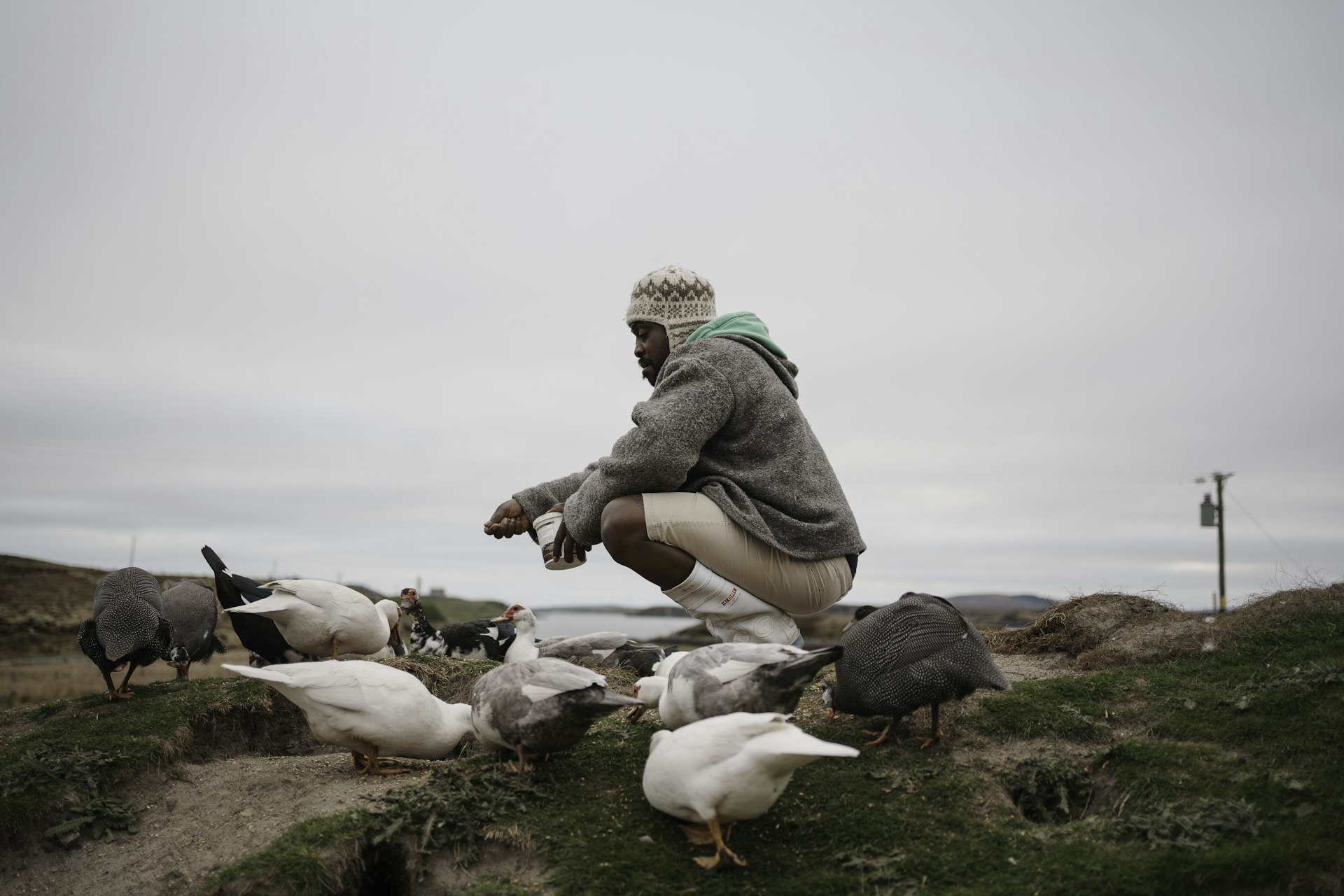
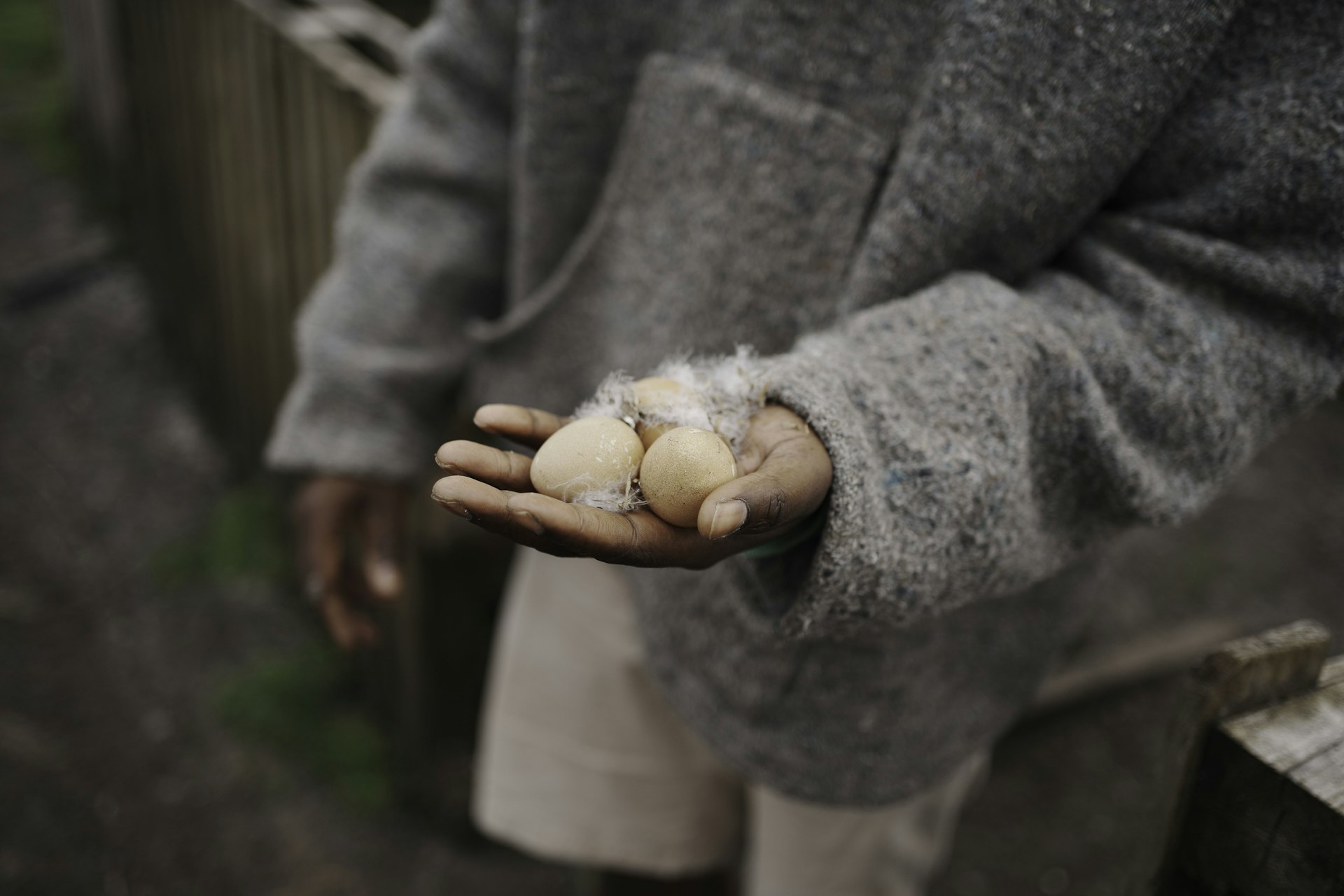
Crofting was designed in the 19th century to protect farmers from exploitation by landlords. Today, it offers Alex a route to secure tenancy on his own 10-acre patch of land on Uist. But first, he had to make a successful application to the Scottish Crofting Commission and prove his intention to live on the croft and work it, as well as making a contribution to the local crofting community.
“Being a crofter is not easy work,” Alex explains. “But I just wanted more time to be able to appreciate the land and walk around, take it all in and plan for the future. My ambition is to create a prosperous permaculture patch paradise for me, my family and my future family. It’s something I hope the next generation will be able to appreciate when I’m dead and gone. I never had time to do that on the mainland because I was working all the time.”
Captured in a BBC Scotland reality series called Return to Uist, Alex, Susannah and Cedar relocated to Uist in search of a richer family life, being able to spend more time together and having space that was truly theirs. Susannah grew up here but never felt fully accepted by her peers. So, they were concerned about how Cedar might be received by the other children and parents on Uist.
Yet, three years in, what brings Alex the greatest satisfaction is seeing Cedar, now aged five, enjoying a more exciting, healthier and freer childhood than would have been possible in London. “Cedar is in his element here,” Alex beams. “Everyone is friendly, Cedar has got loads of good friends. There are fields and lochs everywhere for him to run around with his mates and have a wail of a time. There’s no crime here so we can just relax, knowing that he’ll be safe. The only thing you have to worry about is the ticks.”
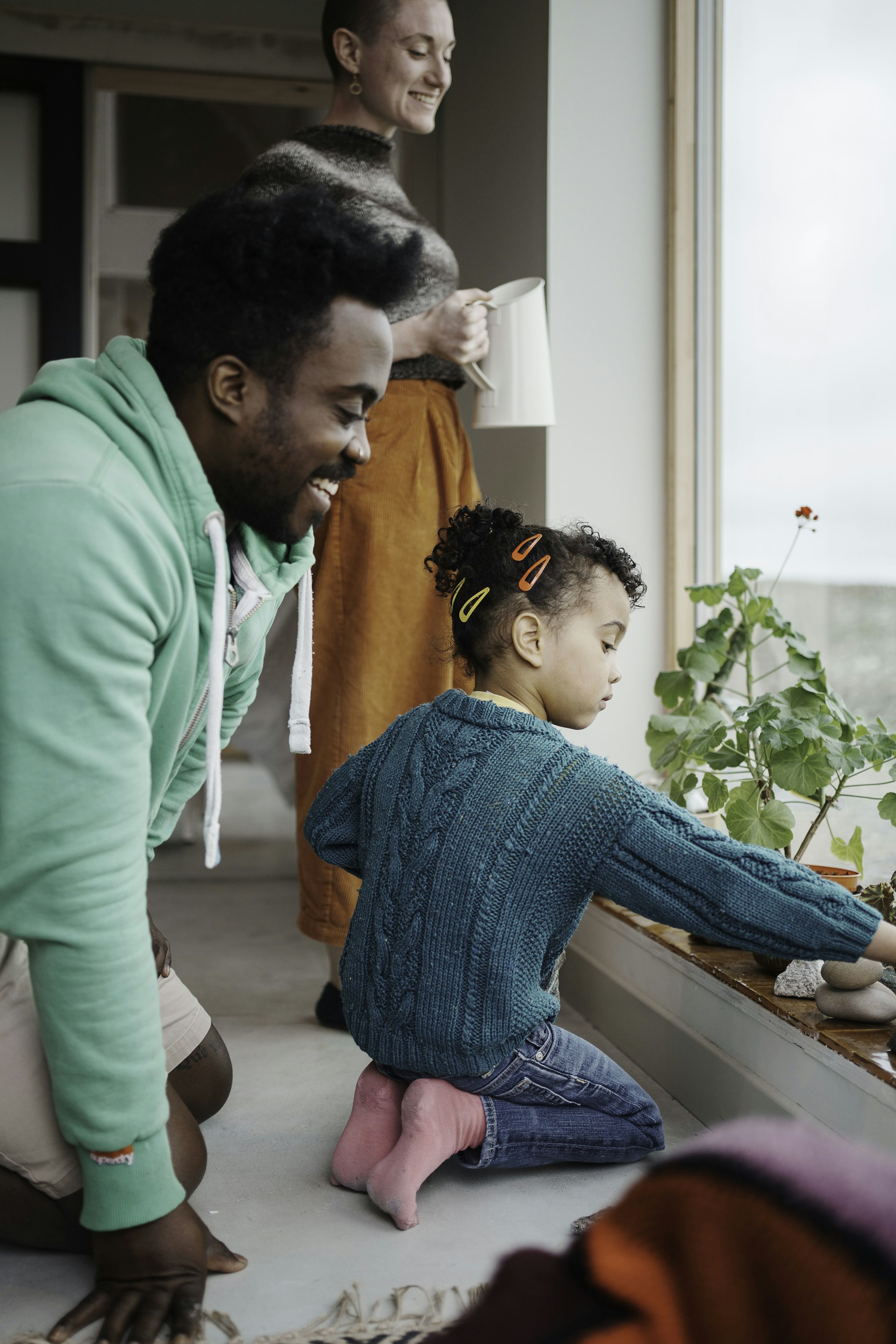
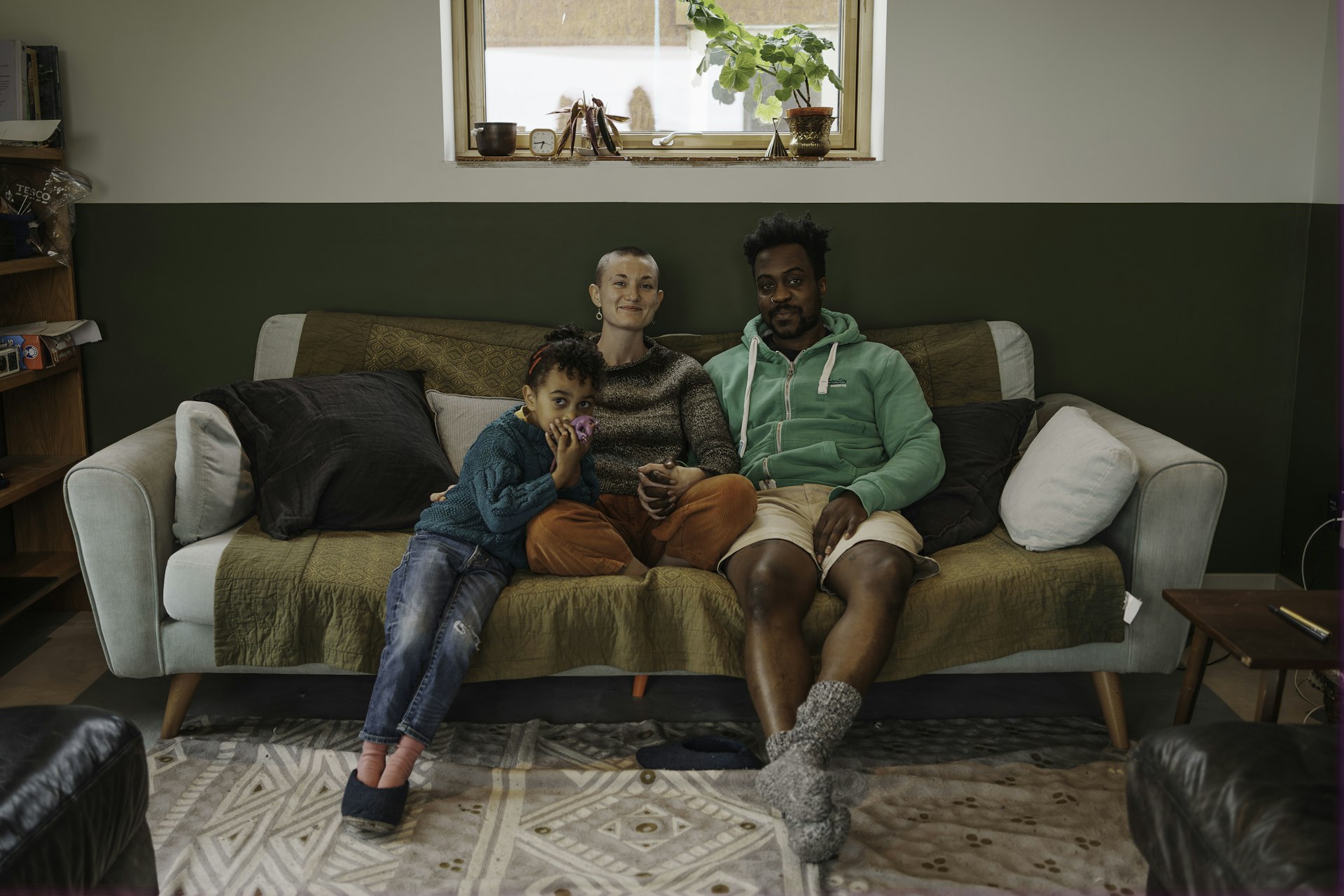

Cedar is being raised by the community – leaving behind the nuclear parenting and expensive childcare back on the mainland. It’s a world away from Alex’s upbringing in South London. Alex was racialised at a young age – which he hopes Cedar will never experience. Aged 14, Alex saved up his paper round money to buy a Pentax MZ-30. Running down the street in Wandsworth, excited by his new camera, he was stopped, searched and interrogated by two policemen. “From that day, I started to realise how I was being perceived differently than some of my friends,” Alex explains. “I started to notice all of these other microaggressions, too. That made me angry and sent me on a bad spiral for a few years.”
After founding his company Mantra Landscapes, Alex would put leaflets through neighbours’ doors wherever he worked, to avoid any negative reactions to seeing a Black man working in the garden. Alex drew motivation from defying people’s expectations, working hard to do the best job he could and be as outgoing as possible – but this had a cost.
“You have to be an ambassador all the time,” Alex reflects. “I’m very open about my mental health, my anxiety and my body. With my therapist, I realised that I was trying to appease a lot of people. I knew there’s not many Black people here, so when people saw me, I was trying to be as friendly as possible, so they would feel relaxed around me. That can be exhausting. Here and in London, I’ve often had to change my behaviour to appease white fragility. I’m not a bad person, I shouldn’t have to think about how people perceive me. I just want to be myself and be accepted.”
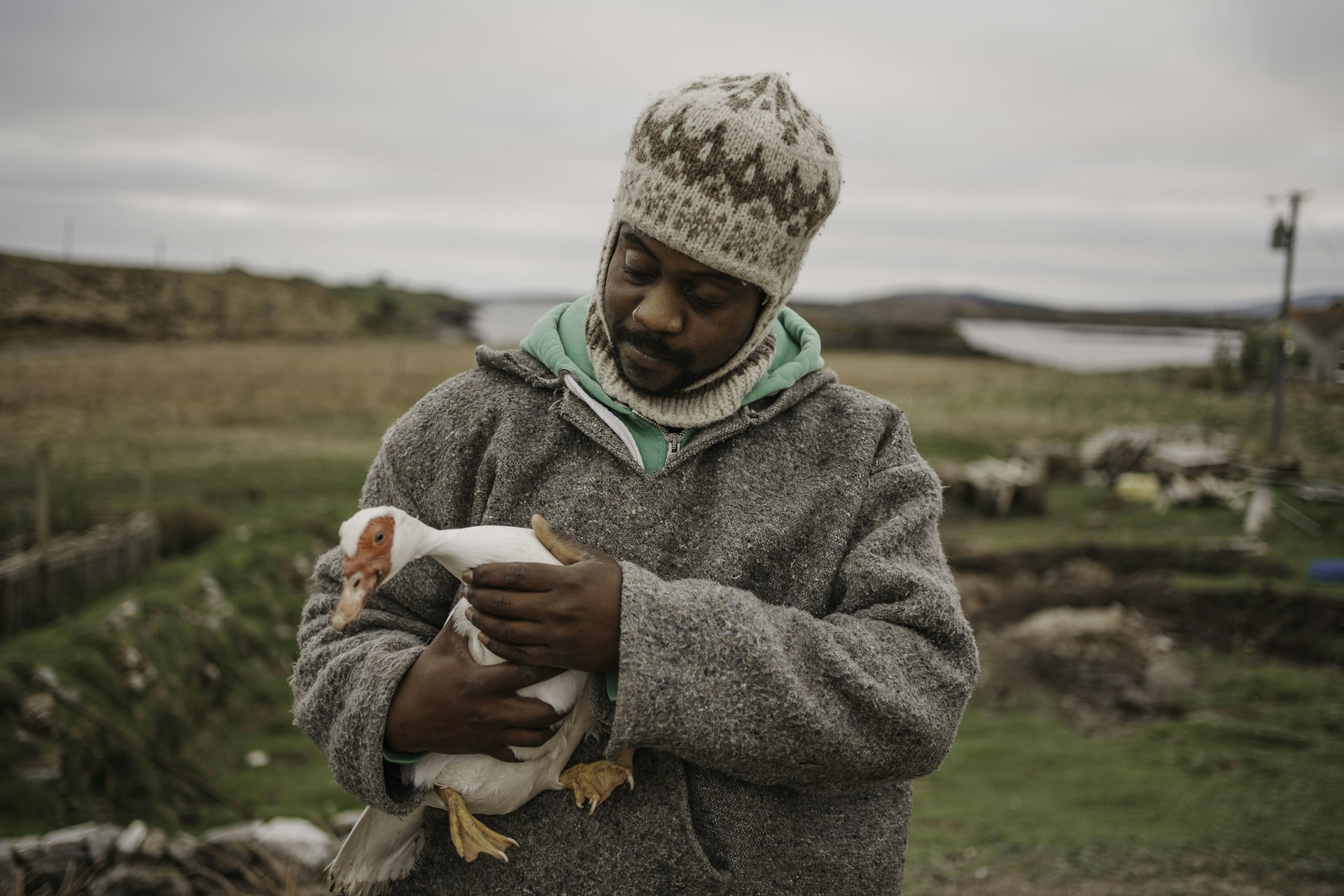
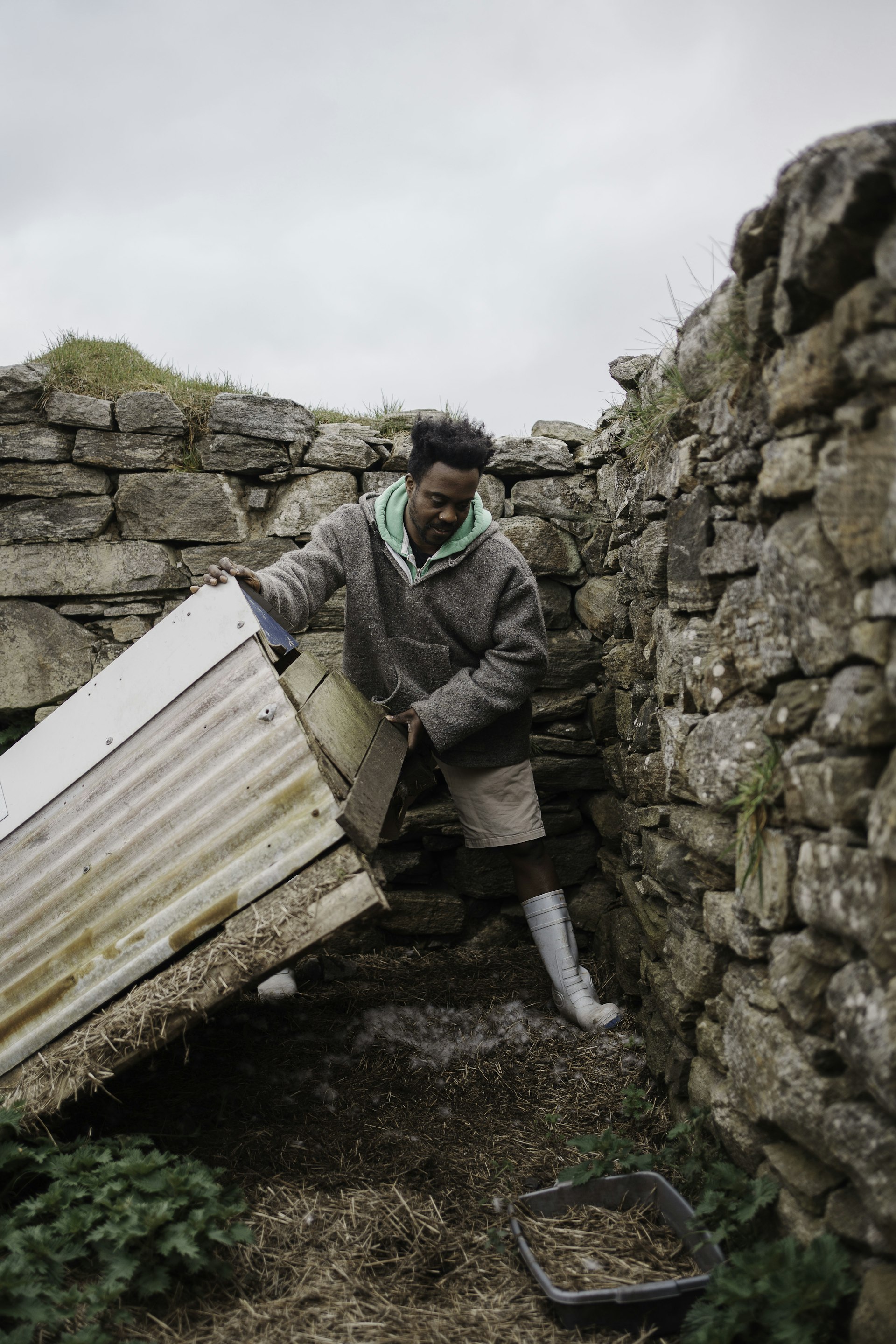
Now that he’s mastered harvesting seaweed, Alex is throwing his energies into developing the croft. He’s growing Comfrey, Willow, Alder, Olearia, Sea Buckthorn and Elaeagnus. He’s built windbreaks and dynamic accumulators and spent the last two months digging a pond for his 22 newborn ducklings.
Alex is hoping to share his experiences and knowledge as widely as possible in order to inspire others to embrace farming and the outdoor life. He’s taking every opportunity to increase representation of Farmers of Colour, from vlogging, to contributing to the Jumping Fences report and appearing in the BBC documentary. But beyond living as an example, he’s opening his doors to others from all backgrounds who feel the allure of farming but are fearful about taking the plunge alone.
“Everyone is a gardener,” Alex explains. “It is possible to start a new career as a farmer and a new life outdoors. But I would advise anyone with that dream to do their research first and see if it is for them. Come and work with me! I organise workaways so that people can experience this life for themselves and understand the land. We should all have the right to enjoy the huge benefits that living and working in nature brings. Being able to grow things on your own land, that’s true wealth.”
Follow Alex on Instagram.
The Outsiders Project is dedicated to diversifying the outdoors. Follow us on Instagram, read more stories or find out more about partnering with us here.
